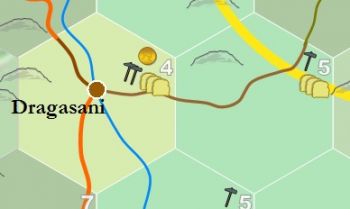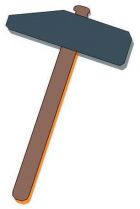Difference between revisions of "Hammer (symbol)"
Tao alexis (talk | contribs) |
Tao alexis (talk | contribs) |
||
| Line 7: | Line 7: | ||
== Number of Hammers == | == Number of Hammers == | ||
{| class="wikitable" style="float:left; margin-right: 15px; text-align: center; background-color:#d4f2f2;" | {| class="wikitable" style="float:left; margin-right: 15px; text-align: center; background-color:#d4f2f2;" | ||
| − | | | + | |- |
| − | ! Hex Type<br>% !! Arable !! Non-Arable | + | ! Hex Type<br>% !! colspan="2"|Hammers Gained |
| + | |- | ||
| + | Arable !! Non-Arable | ||
|- | |- | ||
| 7 || 0 || 2 | | 7 || 0 || 2 | ||
Revision as of 00:45, 24 March 2022
-
 6-mile map of the village Dragasani and surrounding area, showing two hammers in a type-4 hex and one hammer in a type-5.
6-mile map of the village Dragasani and surrounding area, showing two hammers in a type-4 hex and one hammer in a type-5.
Hammers are symbols used on game maps to represent the number of accumulated facilities that a given civilised hex has constructed and presently maintains. The number of hammers possessed by a hex is determined by the hex type, which in turn is a product of infrastructure. Hex types range from 1 to 8, with a "1" indicating a highly civilised hex and an "8" indicating uncivilised wilderness. Thus, type-1 and type-2 hexes possess many hammers, while type-7 and type-8 hexes may have none at all.
Contents
Number of Hammers
Arable !! Non-Arable| Hex Type % |
Hammers Gained | |
|---|---|---|
| 7 | 0 | 2 |
| 6 | 1 | 2 |
| 5 | 1 | 3 |
| 4 | 2 | - |
| 3 | 3 | - |
| 2 | 4 | - |
| 1 | 4 | - |
6-mile map hexes also possess two designations: arable and non-arable. With very few exceptions, type-1 to type-4 hexes are always designated as arable; type-5 to type-7 hexes may be arable or non-arable; and type-8 hexes are always treated as non-arable, though some may have the potential to be made arable. Since type-8 hexes don't gain hammers under any circumstance, they are not included on the table shown.
